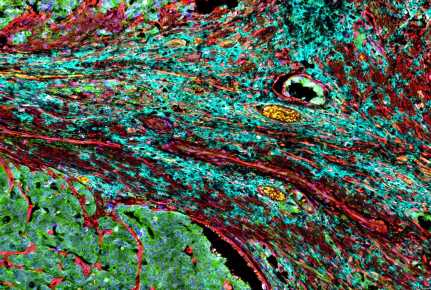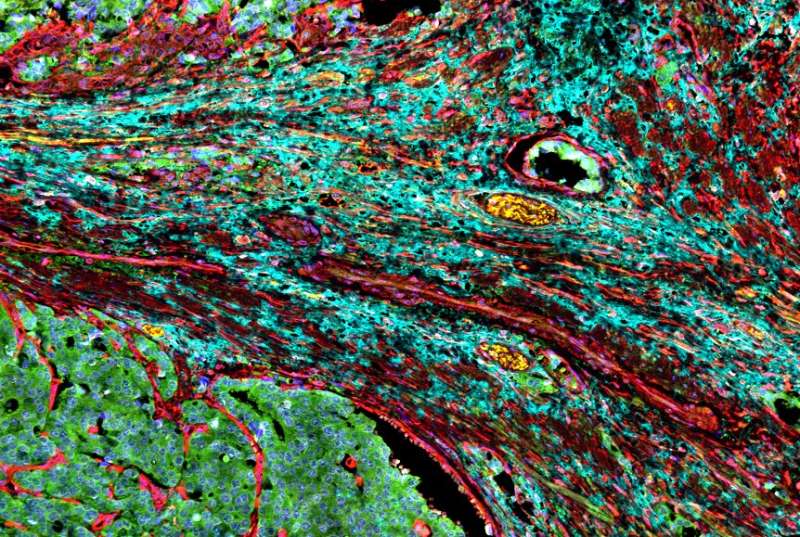

Tumors can force neighboring cells into supporting cancer growth by releasing lactate into their local environment, according to researchers at Weill Cornell Medicine. The findings pave the way for future drug treatments that thwart that defense mechanism to help cancer patients.
In the study, published May 10 in Cell Reports, the researchers determined how tumors, as they develop, recruit nearby cells called fibroblasts to work as their enablers. Fibroblasts are part of the “stroma,” or connective tissue of organs, and normally have important repair and maintenance functions. But cancer-associated fibroblasts (CAFs) acquire properties that allow them to assist tumors in ways that make the tumors more malignant and harder to kill.
The researchers also discovered that widely used cancer drugs called PARP-1 inhibitors mimic one of the key steps in CAF recruitment, and thus may often hobble their own effectiveness by switching local fibroblasts to this cancer-enabling mode.
“Future therapeutics that block this cancer-associated state of fibroblasts might be useful on their own or as a way to improve the effectiveness of PARP-1 inhibitors,” said study co-senior author Dr. Maria Diaz-Meco, the Homer T. Hirst III Professor of Oncology in Pathology and a member of the Sandra and Edward Meyer Cancer Center at Weill Cornell Medicine.
Dr. Diaz-Meco collaborated in the study with the laboratory of co-senior author Dr. Jorge Moscat, also the Homer T. Hirst III Professor of Oncology in Pathology and a member Meyer Cancer Center at Weill Cornell Medicine. The co-first authors are Dr. Juan Linares, instructor in pathology and laboratory medicine, and Dr. Tania Cid-Diaz, postdoctoral associate in pathology and laboratory medicine.
Scientists have known for decades that developing tumors often modify their local environments in ways that promote their own survival and growth. Cancer-associated fibroblasts are a central component of the tumor microenvironment in prostate, lung, colon and many other cancer types. Targeting these cells is therefore seen as a promising complementary approach to standard cancer treatment—and one that could work very broadly against cancers of different cellular and genetic origins.
“Cancer-associated fibroblasts support tumor growth by providing growth factors and essential metabolites to the tumor, by fending-off anti-tumor immune cells, and in many other ways,” Dr. Moscat said. “The result is a tumor that is more malignant and treatment-resistant.”
The Moscat and Diaz-Meco laboratories discovered several years ago that a protein called p62, produced in fibroblasts, normally suppresses the CAF state, though many tumors find a way to restore this state by dialing down fibroblast p62 production. In the new study, they showed that tumors achieve this by secreting high levels of an organic compound called lactate, also known as lactic acid.
Lactate is a normal byproduct of certain energy-production processes in cells—processes that are often hyperactive in tumors. In experiments with prostate cancer cells, the researchers detailed the molecular chain of events by which tumor-secreted lactate disrupts the normal metabolism of fibroblasts, leading to a downshifting of p62 gene activity and the activation of the tumor-enabling CAF state.
On its own the finding is significant because it illuminates a major cancer-promoting pathway, which in principle can be targeted with future drugs as a standalone or add-on treatment strategy.
But there was a second, surprising finding. A key step leading from tumor lactate secretion to fibroblast p62 suppression turned out to be the inhibition of a DNA-repair enzyme called PARP1. A class of cancer drugs called PARP1 inhibitors has the same effect—suggesting that these drugs might be working partly against themselves by creating a more tumor-friendly microenvironment.
The researchers confirmed in cancer cells and mouse models that the PARP1 inhibitor olaparib does reduce p62 in fibroblasts, and pushes them into the CAF state, which in turn makes tumors more resistant to the drug’s primary cancer-killing effect.
Thus, the researchers emphasized, future treatments that reprogram CAF cells to the non-cancer state or prevent their development might greatly enhance PARP1 inhibitors’ anti-tumor effectiveness.
Source: Read Full Article